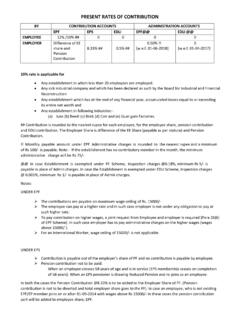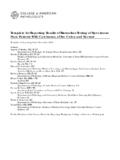Transcription of The Contribution of Native Ethiopian Philosophers, …
1 The Contribution of Native Ethiopian Philosophers, Zara Yacob and Wolde Hiwot, to Ethiopian philosophy By: Tassew Asfaw Department of philosophy May, 2004 The Contribution of Native Ethiopian Philosophers, Zara Yacob and Wold Hiwot, to Ethiopian philosophy Introduction Zara Yacob was born from poor farmers in Aksum. He studied the books of the psalms of David and the interpretation of the Holy Scriptures. This experience helped him to begin his philosophy during his two years time in the cave near the Tekeze River to escape from the accusation of king Susenyos for his position of being the enemy of Catholic faith. Wolde Hiwot was tutored by Zara Yacob in grammar, quine, and interpretation of the Holy Scriptures, and he also became Zara Yacob s confidant. This helped him to write his philosophy following the philosophical system of his teacher.
2 The original works of these two Ethiopian philosophers was translated and introduced to the philosophical world by Claude Sumner, an Indian professor who was teaching at Addis Ababa University. Here, I would like to introduce the Contribution of these Native Ethiopian philosophers, Zara Yacob and Wolde Hiwot, through referring to different branches of philosophy . Thus, I will explain the Contribution of these philosophers to metaphysics, epistemology, Ethics, Aesthetics, and logic. In addition to this, their Contribution to gender issues will also be discussed. 1. The Contribution of Zara Yacob and Wolde Hiwot to Metaphysics Metaphysics can be defined as the study of reality in broad sense. It can be also defined as the study of transcendental reality, which lies beyond the physical world and cannot be grasped by means of empirical observations.
3 Super naturalists understand Meta physics in its broader sense 1 because they raise questions of reality like what is reality? What is real/, is it one or many? And so on. They also understand metaphysics in its narrower sense because they believe in supernatural or transcendent reality, say God. Zora Yacob and Wolde Hiwot raised those and similar questions because of this they can be categorized as super naturalist philosophers. Let us first look at the method of Zara Yacob, which was used to prove the existence of God. He raised metaphysical questions like, How does God know; or is there any one in heaven who knows? Or if there is one who knows, why does He remain silent on men s depravity while they corrupt His name act with iniquity in His holy name?
4 (Sumner, 1985, ). Zera Yacob raised these questions because he observed that the followers of every religion argued as if their faith was true and the other s faith was false. They were defending their own faith while rejecting other faiths. Moreover, he was praying that his God would make him intelligent and reasonable in order to be able to know the hidden wisdom of God. He tried to prove whether there is God or not using his own metaphysical theory as follows: One day I said to my self in my own thought whom am I praying to or is there a God who listens to me? At this thought I was invaded by dead full sadness and I said: In vain have I kept my own heart pure (as David says). Later on I thought of the words of the same David, Is the inventor of the ear unable to hear?
5 And I said: who is it that provided me with an ear to hear, who created me as a rational [being] and how have I come into this world? Where do I come from? Had I lived before the creator of the world, I would have known the beginning of my life and of the consciousness [of myself] that created me? Was I created by my own hands? But I didn t exist before I was created. If I say that my father and my mother created me, then I must search for the creator of my parents and of the parents of my parents until they arrive at the first who were not created as we [are] but who came into this world in some other way without being generated. For if they themselves have been created, I know nothing of their origin unless I say, he who created them from nothing most be an uncreated 2 essence who is and will be for all centuries [to come] the lord and master of all things, without beginning or end, immutable, whose years cannot be numbered.
6 And I said: Therefore, there is a creator; else there would have been no creation. This creator who endowed us with the gifts of intelligence and reason, cannot he himself be without them? For he created us as intelligent beings from the abundance of this intelligence and the same one being comprehends all, creates all, is almighty. And I used to say: my creator will hear me if I pray to him, and because of this thought I felt very happy. (Sumner, 1985, ). The long paragraph above shows the method of doubting used by Zara Yacob to prove the existence of God. And it also shows that Zara Yacob didn t accept God as unquestionable entity because of this it may be possible to say that Zara Yacob s God wasn t the same as that of the Christian s God, which is unquestionable and blindly accepted through faith.
7 After proving the existence of God, Zara Yacob questioned whether every thing that is written in the Holy Scripture is true or not. He wanted to consult scholars and thinkers but he realized that these individuals would tell him only what they were supposing as true or they would tell him only the rightness of their own faith. Because of this they can t be taken as neutral judges. He also examined the written documents of other religion and concluded that, there are true as well as false concepts so that we have to distinguish falsity from truth through rationalization of these concepts. This shows that Zara Yacob didn t accept the Christianity and the Holy scripture as they are. He rejected some of the points, which don t have any rational basis.
8 Because of this, Zara Yacob s religious ideology as well as his God was to some extent different from Christians, and other religious ideologies. Therefore, he has his own Meta physical foundation for the existence of God. 3 Wholde Hiwot also raised Metaphysical questions on the existence of God. He used empirical method to prove the existence of God. According to him, all things we see in this world, including ourselves, are transitory and created. But how can they be created without a creator? Because each creature is finite and weak; it has no power to be created from nothing. Therefore, there needs be one essence, that existed before all creatures, without beginning or end, that created from nothing all that is dense and thin, visible and invisible- God.
9 For him the perfection of God can also be understood from his creatures. All that has created is very good in the way He created it. Some people may classify things as useful and useless because they are unable to understand in the way God created them. Hence, some things, which were considered as useless in the past, become useful in the present. This shows that human mind is less perfect than God. Because of this, people can t understand every thing in the way they are created. Therefore, for Wolde Hiwot, God is created out of nothing and every creature of his has purposes. But since human mind unable to understand the whole works of God, people may consider some of the creatures as useless. Descartes also used this method of proving the existence of God by negating the finite.
10 According to Descartes, more reality is found in the infinite substance than in the finite. Moreover, the idea of God existed before the idea of human being. Doubting and desires in human being implies lack of something. This recognition of detects for man himself resulted from some idea of a more perfect being. (Maynard, 1952, ). 2. The Contribution of Zara Yacob and Wolde Hiwot to Epistemology Epistemology can be defined as the theory of knowledge. It attempts to answer questions like where does knowledge come from? What is the 4 basis of knowledge? And so on. For rationalist philosophers the source of knowledge is reason while for empiricist philosophers the source of knowledge is experience. Zara Yacob and Wolde Hiwot can be considered as rationalist philosophers in loosen sense because rationalism, in the loosen sense, is the belief that at least some knowledge about reality can be acquired through reason independent of sense experience.




